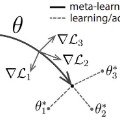In this work we introduce a novel meta-learning method for sleep scoring based on self-supervised learning. Our approach aims at building models for sleep scoring that can generalize across different patients and recording facilities, but do not require a further adaptation step to the target data. Towards this goal, we build our method on top of the Model Agnostic Meta-Learning (MAML) framework by incorporating a self-supervised learning (SSL) stage, and call it S2MAML. We show that S2MAML can significantly outperform MAML. The gain in performance comes from the SSL stage, which we base on a general purpose pseudo-task that limits the overfitting to the subject-specific patterns present in the training dataset. We show that S2MAML outperforms standard supervised learning and MAML on the SC, ST, ISRUC, UCD and CAP datasets.
翻译:在这项工作中,我们引入了一种基于自我监督学习的新颖的睡眠评分元学习方法。我们的方法旨在建立睡眠评分模型,该模型可以覆盖不同的病人和记录设施,但不需要对目标数据采取进一步的适应步骤。为了实现这一目标,我们在模型Agnistic Meta-Learning(MAML)框架之上,通过纳入自监督学习(SSL)阶段,并称之为S2MAML(S2MAML ) 。我们表明S2MAML能够大大优于MAML(MAML ) 。性能的收益来自SSL 阶段,我们基于一个一般目的的假任务,它限制了对培训数据集中特定主题模式的过度适应。我们显示S2MAML(MAML)比SC、ST、ISSRUC、UCD和CAP数据集的标准监督学习和MAML(MAM)要优于SC、ST、IS、ISSRUC、UD、UCD和CAP数据集。




